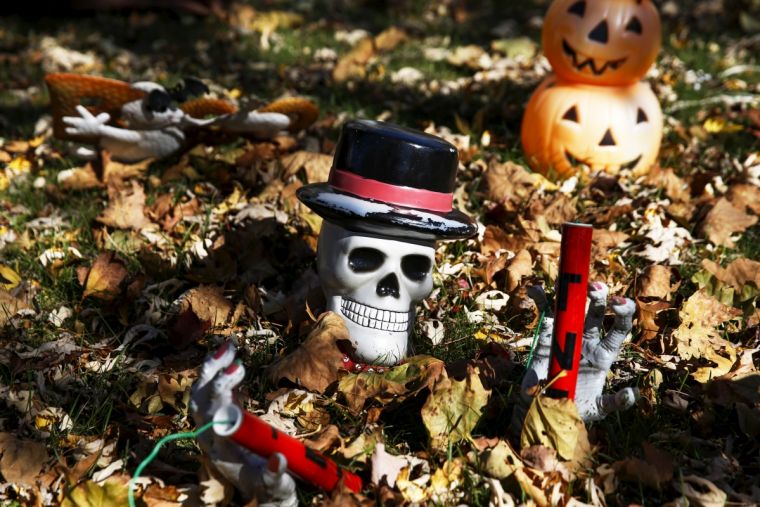'Killer Clowns' And Flesh-Eating Zombies: How To Talk To Your Kids About Hallowe'en

There's a hot topic spreading like wildfire around schoolyards everywhere right now. Fuelled by media hype around a few isolated incidents in the US and UK, rumours abound that chainsaw-wielding 'Killer Clowns' lurk around every corner, just waiting to kidnap innocent children and generally menace society.
In the relative safety of the school playground, imaginations run wild and stories escalate. Killer Clowns – or men with far too much time on their hands and serious mounting credit at the local fancy dress shop – have allegedly been sighted in every town and village in the United Kingdom, despite the fact that only a handful of confirmed incidents have occurred. By day, small children egg each other on with speculation, excited by the chance to tell a scary story. By night however, something very different is going on.
Away from the banter and bragging of the schoolyard, small children are left to reflect on these stories in the darkness of their bedrooms. And in many cases, especially when they've seen frightening photographs (in many cases helpfully mocked up by the media), images of maniacal monsters in masks circle their minds and invade their dreams. Many parents are reporting that their children are terrified.
All this comes at a time where mainstream Halloween is becoming increasingly gruesome. As concepts such as the zombie slowly become normalised from the domain of restricted movies to that of kids' birthday parties, it seems that a festival most enjoyed by children is now illustrated with worryingly adult content. Kids no longer Trick or Treat in cute pumpkin costumes; they're more likely to look like they've just survived a serious road accident. All of which might be fun at the time, but again leads to tearful, anxious bedtimes, especially for younger children.
There's little point bemoaning the popularity of America's favourite festival; it's here to stay, and the gradual creep of culture suggests it's only going to get scarier. This year, the occasion has an especially unpleasant subplot, and the hope is that at least this particularly unfunny clown episode will be short-lived. So what can parents (and perhaps also teachers and children's workers) practically do when their children are terrified about the imaginary monsters that they see being given form at this time of year?
1. Listen
The most obvious starting point is to not brush this subject under the carpet. Don't tell your children not to worry about it, and to stop being so silly. Their fears are legitimate, and have been cooked up in a climate of scary stories and in a visual culture, often remarkably terrifying imagery. Take time to listen to your child's concerns; even knowing that you've listened and taken them seriously helps to counter that feeling of loneliness and fear they might feel when the lights go out.
2. Establish what's real
As Jesus once said, "the truth will set you free", and while that's somewhat taking him out of context, that statement is still helpful here. We need to take time to explain the difference between fiction and reality to our children, especially when the media might be doing its best to blur the lines. Once children understand that the monstrous Bobo rampaging around the streets with a plastic chainsaw is actually a bloke called Derek who just got fired from his job at Pizza Hut, the 'Killer Clown' suddenly becomes a lot less terrifying. It's also good to remember and to remind kids that despite our culture's obsession with them, ghosts, zombies and other monsters aren't real. Although the jury is still out on whether Donald Trump is an elaborate hoax.
3. Counter fear with love
There's a beautiful line in 1 John 4 where the writer says that "perfect love casts out fear." Of course, John is writing about the flawless, unconditional love of God here, but we at least try to echo that love in the way that we parent our children. The best way to take our kids' thoughts away from monstrous ideas and mental images is to love them; to make them feel wanted, comforted, cared for and protected, that they belong in our family and that nothing is more important to us than them. Being able to reflect on these things, especially before bedtime, can help settle nerves and refocus worried heads.
4. Offer to pray
If you're scared of the dark, the idea of appealing to the light is actually pretty encouraging, whether you're five or 55. So let's reach for that perfect love we were just talking about; asking God to help us to sleep soundly and to fill our heads with happy thoughts. My own kids have been asking me to do this with them since they were very small; to them it's just good sense.
The world can be a scary place when you're five, six or seven years old. It's pretty terrifying at times when you're 38. We can't shelter our kids from a world that wants to tell them stories about monsters and menace, but by talking honestly and openly together, and perhaps also by modelling handing our worries over to God, we can equip them to deal with their fears healthily.
Martin Saunders is a Contributing Editor for Christian Today and the Deputy CEO of Youthscape. Follow him on Twitter @martinsaunders.











